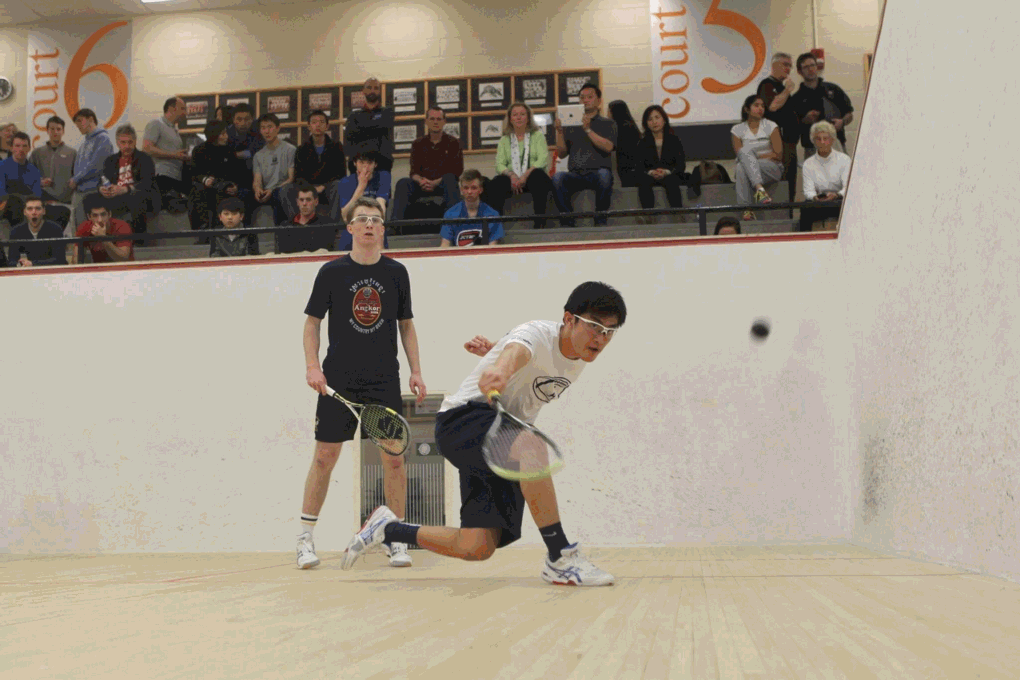Max Guo ’17, Sonam Saxena ’17, Thomas Woodville ’17: The practice of cutting student-athletes from certain sports is a controversial topic around Episcopal. Some believe it is not fair or even right to cut students from the sport that they have demonstrated some sort of interest in, but many fail to realize the benefits that cutting brings to the team in the future.
Tina Rix, Episcopal Girls Varsity Head Coach and co-Director of Squash, explains, “Cutting these players from the teams builds a stronger team in the long run. It really benefits those kids who work hard and make the teams themselves. With unlimited court space and time, we would love to not have to cut players, but at the moment, logistically it does not work out.” Especially with a sport like squash, court time is key to building a strong and formidable team, and for this reason it is necessary to limit the number of players who will be able to receive this coveted time and training.
Aaron Kim ‘15, captain of the Varsity Boys Squash team notes, “Obviously I wish that everyone who came out to tryouts could have had the opportunity to play squash this year, but court logistics make that difficult. Even though we are lucky enough to have ten courts, it would not be enough to give sufficient court time if there were to be more players. The cuts make practices more effective for the higher level players as they can have more focused practice time with their respective coaches.” Although certain athletes would like to play squash, especially for those without much experience, it is tough to allocate playing time for less experienced athletes given the limited resources, which both the coaches and captains understand. John Russell, Head Coach of the Boys Varsity Squash Team, explained, “It would almost be detrimental to the players to have everyone on the team without cuts, as there would just be way too many people on court and off court.”

Photo Courtesy of Dale Walker
One of the athletes who wasn’t able to receive said court space is Avi Shah ‘17, cut from the team this past squash season. He states, “I think that it is quite fair. It limits the spots to kids who work and are passionate about those sports. Kids like me who just picked up a squash racket do not deserve to take a passionate player’s spot.” He indicated that he put no preparation into playing the sport, and understood the separation between him and some of the other players on the team. In sports like these, the results and ladders are very clear cut. Russell explained, “It should be clear as to who the stronger players are versus the not as strong. Squash is a very black and white sport with scores that don’t lie, making the results and therefore the teams almost irrefutable.”
Furthermore, the coaches do not leave these athletes hanging even after being cut. From here, these players have many options, including Intramural Squash in the spring to continue playing, taking lessons or receiving coaching time outside of practice time, and simply choosing another sport. As both Russell and Rix explain, “Many players, even after being cut, want to take lessons and work with us to become better in preparation to make the team the next season. They understand that the players who succeed are the ones who put in the work, and so this motivates those who have been cut to work harder at the sport and hopefully evolve their passion for the sport.”
For some, however, there is an emotional side to being cut from a team. Do people who are cut from a sport care that they were cut from that sport? Are they angry that they can’t play the sport that they want? It’s a comparison of expectation and reality. If the athlete has done no preparation for the sport that they “want” to play, can they really expect to make the team? Isn’t it reality that people who put in minimal effort into an activity will likely be asked to stop doing said activity? Shah continues, “I tried out for the team with very small scale goals, for example to get a good workout and have some fun. I should have expected to get cut based on where I sat relative to other players on the team. I honestly wasn’t fazed at all.”
It is only fair that some athletes are cut from a given sport if they show that they lack experience. Students cannot expect to walk into a sport that is so demanding, especially ones with players competing at high levels, and expect to make the team. If someone wants to make the team, he or she needs to put in the time and the effort necessary to be competitive and make the best use of the limited resources the sport is given.